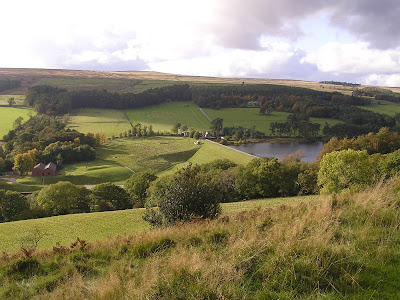An Autumn walk around the Tungstall reservoir near Wolsingham on a sunny day is what is needed to keep vitamin D levels high when the clocks goes back to winter's time. According to the Wikipedia: "Tunstall Reservoir was a water supply storage reservoir completed in 1879, and now used solely to maintain minimum regulatory flows on the River Wear in northeast England. It is situated in the north Pennines of the United Kingdom, and lies 3.5 km north of the village of Wolsingham, in Weardale, County Durham." The services provided by this water reservoir, as well as from many others in England and Wales, were privatised in England in the late 80s during Margaret Tatcher's conservative government due to the underfunding of the water sector by the State. According to Wikipedia: "The water privatisation in England and Wales involved the transfer of the provision of water and wastewater services in England and Wales from the state to the private sector in 1989, through the sale of the ten regional water authorities (RWA) (...) " the RWAs were hampered by chronic underfunding and lack of investment from central government. Underinvestment in infrastructure combined with sustained water pollution by industry contributed to a continued decline of both river and tap water quality. (...) England and Wales became the only countries in the world to have a fully privatised water and sewage disposal system." With the privatisation of the water sector, water became a commodity rather than a right that people should have. Joseph Chamberlain, who was one of the main early supporters for the nationalisation of the water supply and sewerage (WSS) system clearly exposed the perversity of privatising a public good such as water: "It is difficult, if not impossible to combine the citizens' rights and interests and the private enterprise's interests, because the private enterprise aims at its natural and justified objective, the biggest possible profit".


No comments:
Post a Comment